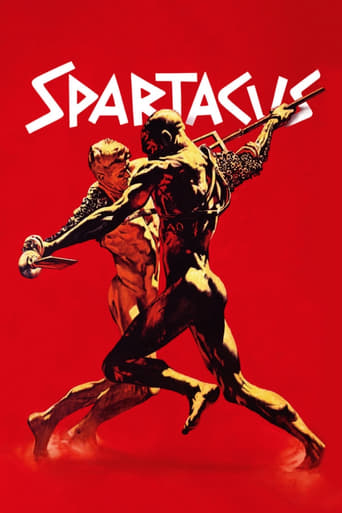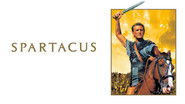HotToastyRag
Just as Ben-Hur is the most famous biblical movie ever, Spartacus is the most famous gladiator movie ever. (Sorry, Russell Crowe.) In 1960, the year after Ben-Hur's spectacular success, producing a three-hour movie about Roman gladiators was risky. Everyone in the audience would be comparing it to Charlton Heston's slavery scenes, so it'd better be good! Well, it was good, and it's remained a classic through the decades.Spartacus focuses on the treatment and life of slaves, and the dissension within the Roman Empire, rather than copying any Biblical theme from the countless religious movies to come out of the 1950s. There are so many famous scenes and lines that have come out of this movie, it's almost superfluous to give a plot summary or even mention the cast. Briefly, Kirk Douglas plays the title character, an unruly slave who is sent to train as a gladiator. He falls in love with Jean Simmons, and while his fellow slaves turn to him as a leader, he bonds closely with one in particular, Tony Curtis. Laurence Olivier, Charles Laughton, Peter Ustinov, and John Gavin give very memorable performances as Roman politicians, a slave trader, and Julius Caesar, respectively.Spartacus is one of those classics, like Gone with the Wind, that everyone sees at least once in their lifetime. If you have no idea what the phrase "I'm Spartacus!" means, your film education missed a key course. Go rent the movie during your next guys' weekend, and get ready to appreciate the movie that fathered all the modern gladiator movies we know and love.
gab-14712
It is really interesting to see why this film, Spartacus was made in the first place. Obviously, historical epics were massively successful during this time period. But this particular film was made as an answer to 1959's Ben-Hur. In fact, it was Kirk Douglas's answer to that movie. Douglas was originally set to star in that movie, but Charlton Heston was cast over Douglas at the last minute, giving Douglas a feeling of bitter resentment. Both films have a very common theme: one man rising against the mighty Roman Empire to fight for their beliefs. I think Ben-Hur is the better film, but there is much to admire about this film.The movie, based off the popular novel by Howard Fast, was written by Dalton Trumbo. Trumbo is a well-known screenwriter, not only for his writing talent but because he was blacklisted because of his associated ties with communism. Kirk Douglas and director Stanley Kubrick stood strong behind their screenwriter and they publicly announced Trumbo wrote their movie, instead of Trumbo hiding behind a pseudonym. I found that to be a very courageous move on the part of Douglas and Kubrick, because that could have easily hurt the movie's chance at the box office. Luckily, the film was a box office smash and was very popular with the critics and the audience alike.This film has a Roman slave named Spartacus (Kirk Douglas) as the film's central character. Spartacus is held at a gladiatorial school ran by the amusing Lentulus Batiatus (Peter Ustinov). One day, he starts a revolt because he became angered at the notion of fighting to the death for the entertainment of spoiled women. This revolt soon spread all across Italy, where thousands of slaves joined the cause. Their plan was for Silesian pirates to transport them away from Italy to new lands. Meanwhile in Rome, Senator Gracchus (Charles Laughton) schemes to have the slaves taken down by a Roman garrison. After they failed, his mentor Marcus Licinius Crassus (Laurence Olivier) decides to lead his own army against Spartacus's slaves. Now Spartacus must face the might and power of the Roman army.Now compared to other epics of the time, I didn't like this film as much. It's certainly not a bad film, not even close to being so. The problem is the movie is a tad overlong and the story drags at certain moments. Some of the dialogue was cheesy too. By today's standards, the dialogue does not hold up very well and some of the words are laughingly bad. These complaints dragged the movie down, but only to a very small degree.There are many things I did admire about the film. There are plenty of majestic battle sequences and I liked them very much. I loved watching how the revolt started and I was cheering for Spartacus the entire time. I liked the political backdrop of the movie. Obviously, Spartacus uprising has a major political undertone which is revolution, a very appropriate theme. We also get to go behind the scenes and see how Roman politics influenced the war. It's a common fact that Roman senators always schemed against each other. The film also did something different, when compared to other epics. These other epics usually provide the normal happy ending. Well, that is not much the case with this film. If you follow history, you'll know the fate of Spartacus. But I'm not going to spoil anything for those who don't know. But the ending was very powerful and memorable. Speaking of powerful, my favorite scene was when a Roman general asked Spartacus's army where Spartacus was. Each soldier stood up and said, "I'm Spartacus." A very powerful scene showing the loyalty the slaves had for Spartacus and his cause.This film was the first big film of Stanley Kubrick's career. He was 30 when he directed the film, but he already had 4 feature films under his belt before this film. He masterfully directed the film, but it is publicly known that he disowned the film. It's his most straightforward film, and it was nominated for 6 Oscars (and won 4 of them). But Kubrick didn't like the film he made. He is one of my favorite directors, and you'll see more reviews of his films down the line.The film features fine performances from everyone involved. One of Kubrick's strengths is getting the very best out of his actors. Kirk Douglas portrayed Spartacus as a strong man driven by perseverance. Peter Ustinov, who won Best Supporting Actor at the Oscars for his role as Batiatus, does a wonderful job. He is consistently funny and he has a great screen presence whenever on screen. Laurence Olivier delivers a deep performance as Crassus, who is identified as bisexual in the movie. Jean Simmons does a good job as Varinia, the wife of Spartacus. She delivered some emotional performances. Just watch the ending of the movie to see why I say so. Also, keep an eye on a meaty supporting turn by Tony Curtis as Antoninus, the man who loves Spartacus like a brother. Finally, Charles Laughton is great as the soft-hearted scheming Roman Senator, Gracchus.Overall, I liked Spartacus, but I didn't really love it much. It runs into some boring stretches and parts of the movie such as the dialogue and costumes don't hold up well. But I liked how the film strived to be more historically accurate than previous epics. This is a nice film to learn something about Ancient Rome. The film does feature wonderful, bold performances, great direction, good production design, and spectacular battles. Not the greatest epics ever made, but good enough.My Grade: B
g-bodyl
Spartacus is a historical epic that follows amongst the footsteps of prior historical epics such as Ben-Hur and the Ten Commandments. I have to admit this film is not nearly as great as those, but I am certainly not bashing this film. The fact is, the film is a tad overlong and the dialogue does not hold up well by today's standards. I can appreciate the fine performances, especially Ustinov's Oscar-winning performance, as well as the steady direction of a legend, Stanley Kubrick. The film has some great action sequences and as a history student, I can appreciate the historical aspect of this film. I also like, unlike other films of its time, where we are not stuffed the obligatory happy ending. Thus, that makes me appreciate this epic even more.Kubrick's film talks about a slave uprising during the Roman era. Spartacus is a slave who does not take pleasure at the fact he is being used to fight at a gladiator school only to receive spoiled girls. He and the rest of the slaves revolt which causes other slaves in the countryside to do the same. Crassus, who is aiming to become a dictator, decides to meet Spartacus and his men in battle.I really enjoyed the performances in this film. I liked Kirk Douglas's strength and perseverance as Spartacus. I liked the comedic timing in Peter Ustinov's performance as the head of the gladiatorial school, Batiatus. Jean Simmons gives a mighty fine performance as Spartacu's lover, Varinia. Finally, I really liked Laurence Olivier's deep, intense performance as Crassus, who wants nothing except for political power.Overall, Spartacus is a fine, entertaining historical spectacle. It features some majestic battle sequences and many fine, if perhaps a little outdated performances. The screenplay was excellent, as it was written by none other than the black-listed screenwriter, Dalton Trumbo. Compared to today's quality, the film doesn't live up to it. But I had a fun time watching this historical epic. Not Kubrick's best, but that doesn't stop it from being a fun watch.My Grade: B+
GusF
Based on the 1951 novel by Howard Fast rather than the events of the Third Servile War directly, the film depicts Spartacus' slave rebellion with all the flair and grandeur that 1960s Hollywood could muster. Directed by Stanley Kubrick, it is a thrilling story of freedom, political machinations and love set in the ancient world. It is a very well written film with often marvellous dialogue.At 43, Kirk Douglas was perhaps a little old to play the title character but he is very good as the dignified, principled man who wishes to free every last slave in Italy. Like Charlton Heston, he has a face that looked as if it was chiseled from marble which gave him the perfect look for historical epics. More importantly, Douglas' performance effectively communicates Spartacus' intelligence and courage and I never doubted why so many would be willing to follow him anywhere. To his followers, he is a symbol of hope or even a Messiah but, for the audience, he is humanised through his relationship with Varinia, played by Jean Simmons. They meet in Batiatus' gladiator training school and soon fall in love. It is a gentle, tender love story and Douglas is at its best in these scenes. He and Simmons have great chemistry. One of the most gifted actresses of her generation, Simmons excels as the proud, brave and intelligent Varinia. As good as she is in her scenes with Douglas, her best moment is the scene towards the end of the film after she is recaptured and sold to Crassus, played by Laurence Olivier, in which he threatens to kill her newborn son if she does not submit to him. Varinia realises that he is afraid of Spartacus and disturbed by the fact that he inspired so much love and devotion, not least of all from her. Simmons, who previously played the Ophelia to Olivier's Hamlet, plays this scene wonderfully and we get a real sense of Varinia's strength.Speaking of Olivier, he is characteristically excellent as Crassus, one of Rome's greatest generals and one of the wealthiest men to have ever lived. A patrician from a very old Roman family who despises the mob, he is an extremely shrewd military and political strategist who manipulates the threat posed by Spartacus to substantially increase his own political standing. He is eventually named Consul of Rome with Julius Caesar as his protégé, thereby beginning the transformation of the Roman Republic into the Roman Empire. On the battlefield, he manages to defeat Spartacus by forcing him to march on Rome where not only his own legions but those of Pompey and Lucullus are waiting for him. Crassus is a very dangerous man of fierce intelligence, which makes him a very compelling character. In his penultimate film before his death in 1962, the great Charles Laughton is wonderful as Gracchus, the (fictional) leader of the Senate and Crassus' hated rival. Gracchus is an interesting character who is even more shrewd than Crassus. He does not believe in the gods but worships them publicly and is perfectly willing to make deals with criminals, namely the Cilician pirates, if he believes that doing so is in the interests of Rome. He is part of the corruption that plagues the Roman Republic but considers that better than a dictatorship and I certainly can't disagree with him there. Gracchus is not a particularly good man but he is a far better one than his rival.As strong as the film's cast may be, it is the one and only Peter Ustinov who steals the show as the slave trader Batiatus. He won the first of two Best Supporting Actor Oscars for the role, the only actor to win an Oscar for a Kubrick film. Batiatus is scornful of Crassus in private but extremely obsequious to him whenever they meet. He has a very strong sense of self-preservation or, to put it another way, he is a complete coward. This is best demonstrated when Crassus orders him to remain in camp the night before the final battle with Spartacus so he can identify him. When Batiatus asks what will happen to him if Spartacus wins, Crassus tells Batiatus that he has no doubt that he will help Spartacus to identify him. This is one of Batiatus' best scenes as it perfectly illustrates that his first loyalty is most definitely to himself. He possibly becomes a better man after being flogged on Crassus' order but he never comes to regret his earlier actions and only agrees to transport Varinia and her son out of Rome in exchange for two million sestertii. Tony Curtis is good as Antoninus and I love the father-son relationship that develops between him and Spartacus but he is underdeveloped, making him the least interesting of the major characters. With his tough guy image, Curtis may have been miscast as a singer and poet with no practical experience of fighting before joining Spartacus' army. The only weak links are Charles McGraw as Marcellus and John Dall as Marcus Glabrus but neither of them have particularly big roles.Overall, this is an extremely intelligent film. Spartacus is crucified, meaning that it lacks a traditional Hollywood ending but there is still a great sense of hope as his son has been granted his freedom. My main historical area of interest is about 2,000 years after Spartacus' death but I think that the film sticks to the general thrust of events while admittedly taking quite a few liberties here and there. However, these are only minor issues which in no way detract from a brilliant film, one of the best of the historical epics which dominated 1950s and 1960s Hollywood.







